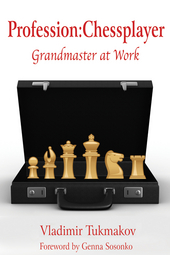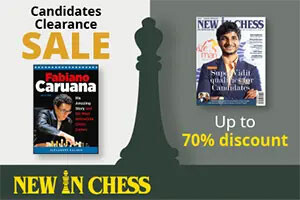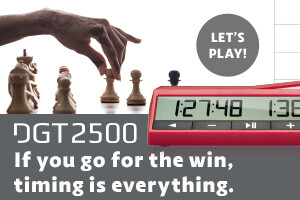Vladimir Tukmakov: Grandmaster at Work
In de krantenrubriek van 15 september jl. schreef Bab Wilders het volgende over het boek van Tukmakov:
Een autobiografische reis langs vele topprestaties zoals 14 Sovjet Kampioenschappen, jarenlang het sterkst bezette schaaktoernooi van het jaar. Met veel foto’s en 40 indrukwekkende partijen van een talent dat nooit helemaal doorbrak maar in de USSR wemelde het nu eenmaal van supertalenten dankzij de schaakscholen en het schaken op school, alles volgens de principes van het Leninistisch–Marxisme.
Trof Tukmakov iemand die ook hield van bloed aan de paal dan werd het spektakel zoals Sax-Tukmakov.
Gewoon maar genieten en af en toe analyseren bv na zet 15 van wit 1.e4 e6 2.d4 d5 3. Pd2 c5 4.exd Dxd 5. Pgf3 cxd 6.Lc4 Dd6 7. 0-0 Pf6 8. Pb3 Pc6 9. Pbxd4 Pxd4 10. Pxd4 a6 11. Te1 Dc7 12. Lb3 Ld6 En nu begint het: 13. Pf5 Lxh2+ 14. Kh1 0-0 15. Pxg7 Td8 16. Df3 Kxg7 17. Lh6+ Kg6 18.c3 Ph5 19. Le3 f5 20.g4 Pf6 21. Lc2 h5 22.gxf+ exf 23.Dg2+ Pg4 24.f3 Lg3 25.fxg hxg 26. Ld4 Txd4! 27.cxd Ld7 28.Kg1 Th8 29. Te3 Th3 30. Dd5 Lf2+ en 0-1. Ook wit dreigt van alles maar zwart komt nu eenmaal eerder zoals vaker in dit soort veldslagen.

De redactie van de Schaaksite heeft dit boekwerk van Tukmakov ook toegestuurd gekregen. Ik heb het met veel plezier gelezen. Ten eerste omdat Genna Sosonko de schaker Vladimir Tukmakov via maar liefst 8 bladzijden introduceert aan het grote publiek (voor zover nodig).
Ten tweede omdat de auteur de situatie in de USSR beschrijft en ons inzage geeft in de "interne competitie" ofwel de strijd die er was tussen grote schakers zoals Karpov, Smyslov en Kortschnoi en grote schaaktalenten. Naar Olympiades konden tenslotte maar enkele schakers afgevaardigd worden. Het boek bestaat uit twee delen. In deel 1 beschrijft Tukmakov zijn leven vanaf de kindertijd, zijn schaakperiode als actief schaker en zijn tijd als schaakcoach van Oekraïne. In deel 2 worden diverse partijen besproken die hij speelde tegen 35 verschillende topschakers zoals Kasparov, Tal, Sokolov en Yusupov.
De uitgever heeft een aantal pagina’s uit het boek in een pdf-bestand samengevoegd. Klik hier (pdf).
Sosonko
Over Genna Sosonko schrijft Tukmakov onder andere (blz. 67) het volgende:
In 1974 the fun came in the form of the IBM tournament in Amsterdam. We went there with Efim Petrovich Geller. It was a traditional tournament with good prizes and it was well-organized, and to get into it was, certainly, a big accomplishment.
Our hotel was located in the center of the city, so immediately after leaving our luggage at the hotel we went for a walk. At the time hearing Russian in Amsterdam was not as common as nowadays. We had barely begun walking when we heard our names called out. It was Genna Sosonko, a good friend, who was also playing in the tournament. I cannot remember now whether he was on the list sent by the organizers to Moscow, or they did not mention his expected participation for a reason. Back then, surprises like that caused an increased level of nervousness in certain departments of certain establishments.
Genna had left his native country not long before, and the coming tournament was one of the first serious chess tests in his new life. In the Soviet Union we frequently found ourselves on the opposite sides of barricades – in 1970 in Riga he helped Viktor Kortschnoi outperform me at the national championship, and, in 1971, he also beat me as a coach during the very same Kortschnoi’s match with Geller, but this never got in the way of our friendship. And before that he had collaborated closely with Mikhail Tal. Intelligence, great social skills, in combination with serious theoretical knowledge and a very good memory made him a superb assistant for the most outstanding chessplayers. He seemed quite satisfied with such a role in chess, as he completely lacked the notorious "killer instinct" necessary for survival in Sovjet chess. We spent hundreds of hours talking about various subjects, but never discussed the why and what for he had emigrated – the answers to those questions were too obvious. Now I think that the most important for him was "why," and the problem of what to do in the West was secondary. Moreover, I have to concede that he did not at all plan to include chess in his new life.
But he had to start with something and first he played in a blitz toumament and then in some amateur competition… Surprisingly quickly, he found himself on the Dutch Olympic team. As it turned out, he could achieve success just playing chess, without forcing either himself or the position. A deep professional approach combined with an excellent theoretical background earned him a unique reputation. In a little while he became a grandmaster and a regular participant in super-tournaments, which were mainly held in Holland at that time.
Dvoretsky
In en buiten Nederland is Mark Dvoretsky een bekend schaaktrainer. Op blz. 76 schrijft Tukmakov het volgende over Dvoretsky:
We had met with Mark at tournaments more than once. He was a strong and original chessplayer, but never stood out at scholastic or youth tournaments. However, quite unexpectedly, after moving to the adult competitions, he accelerated enormously. The quality of his play and his results improved. Mark played in the top league twice in a row, and one time he finished in the top half of the crosstable, which at the time was considered a major achievement, and, on a regular basis, he began to beat strong chessplayers. It became apparent that he had invested a lot of effort, and the result – the rank of grandmaster – was not far away.
However, right at that time Dvoretsky sharply changed the direction of his chess activities and switched entirely to coaching. This work is very similar to that of a doctor — both have to come up with the diagnosis first, and after that prescribe a treatment Mark started with self treatment, but from experience I know how ineffective this job can be: both the doctor-patient relationship and the patient’s limitations are always in the way. Besides, the chess traits call for one more profession – the pharmacist’s. The doctor oniywrites the.prescriptions the patient must go to a drugstore. The chess coach can prepare the medicine himself. I believe that this process captivated Dvoretsky and distracted him from his own career as a chessplayer.
He quickly became a leading world expert in chess homeopathy, carefully selecting and dosing out combinations and problems, depending on the diagnosis of the trainee. The new method was especiallyefi’ective when he worked with young, talented but still not quite accomplished chessplayers. It was extremeiy interesting and useful to me to observe this process and participate in it. Idisagreed with Mark in one aspect only. Dvoretsky, foilowing Lasker and Spassky, proclaimed that he was responsible only for the training but not for the resuits, thereby distancing himself from the possible failures of his trainees. I believed, and still do, that the coach bears equal responsibility for both the triumphs and the failures of his trainees.
Wijk aan Zee
Uiteraard komt Wijk aan Zee regelmatig in het boek voor. Met name het toernooi waarbij gekozen was voor de knock-out formule krijgt aandacht (blz. 107):
Unfortunately, the main tournament of the Wijk aan Zee festival did not go as planned. That particular year, the organizers abandoned the traditional roundrobin format and tried something experimental that was never repeated.
The idea was that the main event was played in the then-unusual knockout format, but the losers were not sent home as they are now, but continued to compete in the Open. To give it a sense of competition, the eliminated players got a certain number of points in the consolation tournament. The losers of the second round joined the open in the fourth round with two points, the third round losers got three and a half points out of five, and the semifinalists joined the open at the end with five and a half points out of eight.
Thus, the winners of matches received a double bonus. Even this description shows that this format is cumbersome and complicated. In reality, the situation was even worse because there were seeded players who began from the second round, so if they lost, they still received consolation points, who knows why. In the first round I was paired with Miguel Illescas from Spain, to whom I lost on tie-breaks. The consolation tournament that I played from beginning to end was rated as a very respectable category 14. Scoring 8 points out of 12, I tied for third/fourth places, and Salov, who had played only four games in the open, was the winner. My "offender" Illescas, somewhat unexpectedly reached the finals and only then lost to Karpov.
Al met al een vlot geschreven en informatief boekwerk. Een aanrader dus. Meer informatie over het boek is hier te vinden: Website Uitgeverij
We hebben verschillende partijen van Tukmakov verzameld om te bestuderen. Het laden duurt de eerste keer wat lang want het zijn 2.400 partijen.

